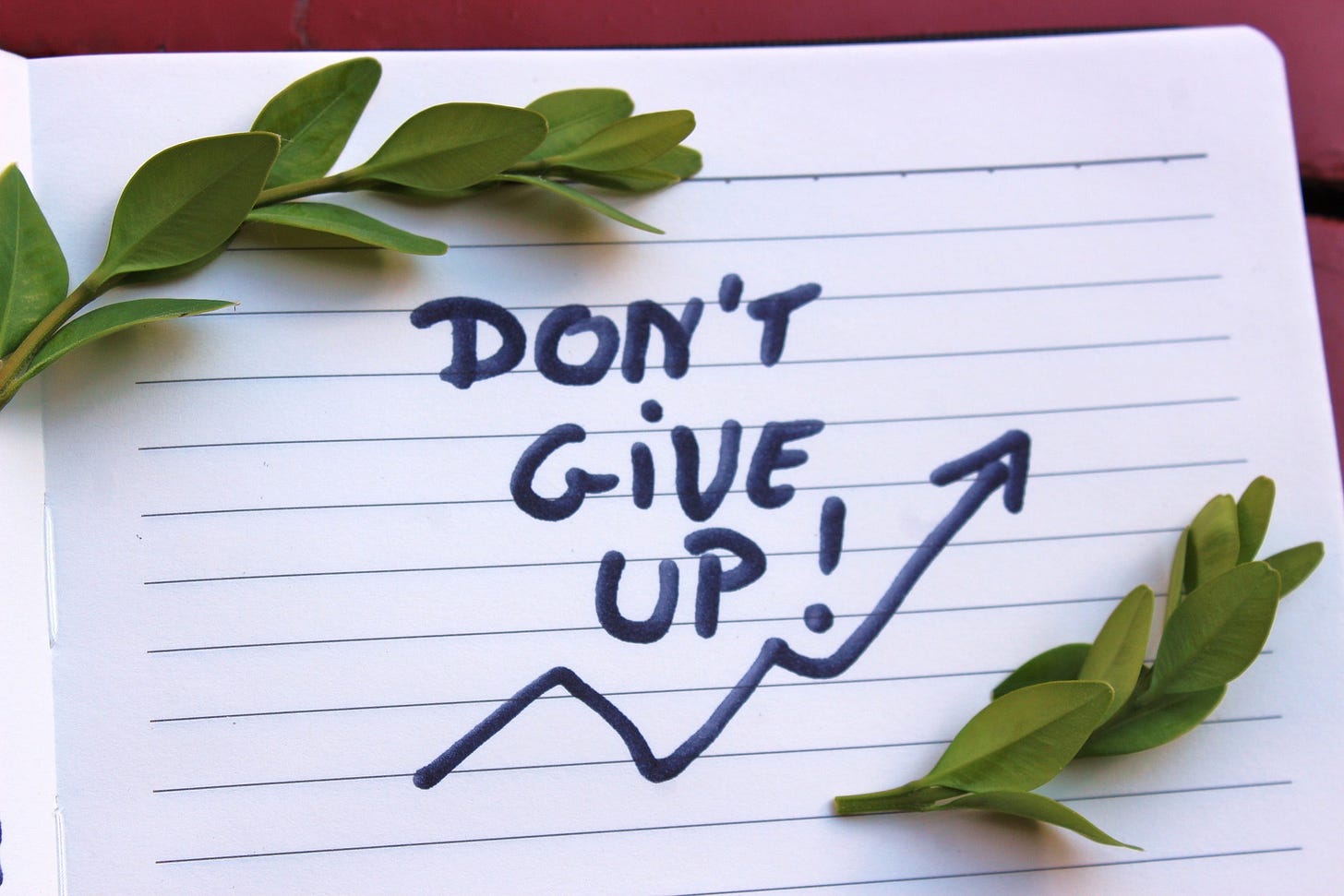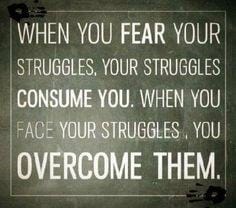Build Unstoppable Motivation
By definition, motivation is the process of taking action in order to achieve a goal. But sometimes action can be hard to initiate, and even harder to maintain. The single best way to increase motivation is to make progress in meaningful work, no matter how small. Motivation leads to greater creativity and productivity. And making progress (being productive and creative) leads to motivation which leads to more work. This is the progress loop, where progress and motivation fuel each other in an upward spiral.” (neuroscienceschool.com)
Think of it like the energy required to get a giant boulder to budge even a few inches. Without initial sheer willpower, you won’t keep moving forward. Isn’t that like any worthy goal you have in fitness, diet or other lifestyle changes? That beginning effort is usually when we’re at our most motivated, but our output seems small at that beginning stage — the boulder barely moved. Full of adrenaline and inspiration, you push with all your might, but you begin to tire out almost immediately because you’re not used to the effort. You try again and again and eventually you stop pushing.
Once that boulder comes to a complete stop, you lose all motivation and your goals remain unchanged and uninspired. What if I could tell you how to keep pushing until you build momentum that brings you towards your goals? Here’s how.
Plan Ahead
A goal without a detailed plan is only a dream. You need to know how you are going to achieve the things you desire, especially if you have to push through hard times. To do so you have to plan it out ahead and then follow through no matter the distractions that come your way.
Write your goals down and make them big to push limits. If your goals don’t motivate you, you won't feel compelled to take action. This is called defining your “WHY.” Without a why, there is no reason to keep going.
But you still have to plan AHEAD and this is where most people fail. They create a beautiful plan, become motivated, take action, make progress and then…become distracted by a temptation, opportunity, or choice that doesn’t lend itself to the achievement of the plan. (probrilliance.com)
Write down all of the potential distractions standing in the way of your goal. Success is less about being disciplined and more about removing the distractions that make progress difficult.
Motivation is fueled by progress, even if only incrementally successful. Let me state that another way:
The single best predictor of motivation is progress in meaningful work, no matter how small. (neuroscienceschool.com)
You make meaningful progress by breaking down your plans into actions, both small and big. Each large action can divided into 5-20 small actions. Write them down and cross them off when completed. When you see small, incremental progress, it will continually fuel your motivation. (Twitter: @LongevLifestyle)
Push Hard
Any life change is going to be hard. How well you’re able to absorb what comes your way directly determines the success you’ll have with your goal.
Here’s a thought by John C. Maxwell from his book, No Limits: Blow the CAP Off Your Capacity. “…Everything worthwhile in life— everything you want, everything you desire to achieve, everything you want to receive— is uphill. The problem is that most of us have uphill dreams but downhill habits. And that’s why we have a cap on our production capacity.”
Let the implications of that statement really sink in and then ponder these points:
· You have to give maximum effort.
· Your goal is worthwhile and good for you.
· Your goal will require demanding, exhausting, strenuous effort.
Uphill will take more than initial motivation. The right thing is the hard thing that sits on top of the hill. Past that initial, brutal push, once you begin to get momentum, your goal comes into view. It requires determination, hard work, and consistentently keeping your eye on your goal. This is something only 5 percent of society understands.
The easy thing requires little more than to slide downhill towards mediocrity, as usual. It’s the one that has no requirements, takes no effort. It’s the easy way out.
Source: justcontinuethatthought.blogspot.com
Stay Consistent
You may have likely come across the phrase: consistency is key. This phrase rings true in all spheres of life because consistency leads to habits, and these habits eventually impact your productivity and performance. In fact, the difference between successful people and those who give up on their goals is consistency, because they dedicate themselves to their goals and staying focused on the things and activities ahead.
Consistency requires a long-term commitment and sustained effort with discipline, accountability, and responsibility (all part of consistency).
Source: entrepreneur.com
The path to developing a consistent work schedule can be challenging. Excuses will come your way and you’ll try to multitask, but you should refrain from that to succeed. To become consistent, build a routine:
Start small and increase in small steps
Do not allow habits to defeat you
Stay at a sustainable, but consistent pace
Remember, no failure is worth throwing the goal away
Focus on one task and today only
It’s important to remember that consistent efforts might not always yield immediate results. They need to be accompanied by patience and discipline, doing things one at a time. Avoid dwelling too much on the future outcomes as that will distract us from what we have to do in the present moment.
Another thing that can be a great deal of help is to practice the idea of doing things 1% a day. Accomplish something every day, learn from it, and improve the next day once you start doing the same thing again. The percentages accumulate, and eventually, you will see yourself meeting the bigger goals that you’ve set in the first place. (morningcoach.com)
…keep knocking, persistently and endlessly, eventually the door will open. —Les Brown
Defeat Obstacles
“If you find a path with no obstacles, it probably does not lead anywhere.” - Frank A. Clark, American lawyer and politician
Obstacles are the stumbling blocks that prevent you from reaching your goals. They are the limiting factors you have to overcome as a catalyst for outcomes otherwise unattainable. (lifehack.org)
Think of problems as opportunities. True results are the outcome of being motivated to face down barriers; to try different tactics and creative approaches to achieve results. If one avenue fails, try another, until through persistence you succeed.
While Thomas Edison has always been thought of as an extremely successful inventor, he has always reminded us that failure and dealing with failure in a positive way is a reality we must face. For example, Edison literally had hundreds or perhaps thousands of failures before he invented a light bulb that succeeded. So to him, how one deals with the inevitable failures that happen along the way can make or break their path to success. (thoughtco.com)
"Many of life's failures are people who did not realize how close they were to success when they gave up."
Instead of being discouraged by problems, achieve success by running toward obstacles. Even if the situation seems hopeless, keep running forward. Success must follow and motivation will stay high.
In Conclusion
Motivation then is transitory unless we gain momentum, no matter how small.
If you want to achieve the greatest success with your goals, you have to get through the initial phase where your work seems to have least effect (the phase where 90 percent of people quit). Do that, and you can achieve anything.
What separates those who have achieved their goal and those that haven't, always comes back to motivation. If you want it bad enough, you'll figure out how to make it a reality.







Hey dear, I really like your work, and I really like the content on this site as well: https://www.mindfulbrowsing.com/